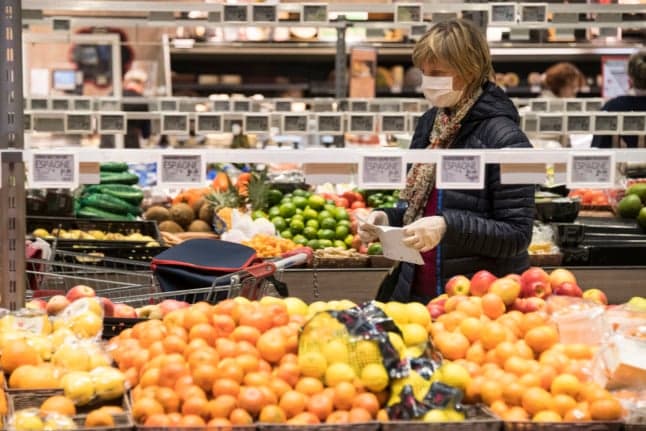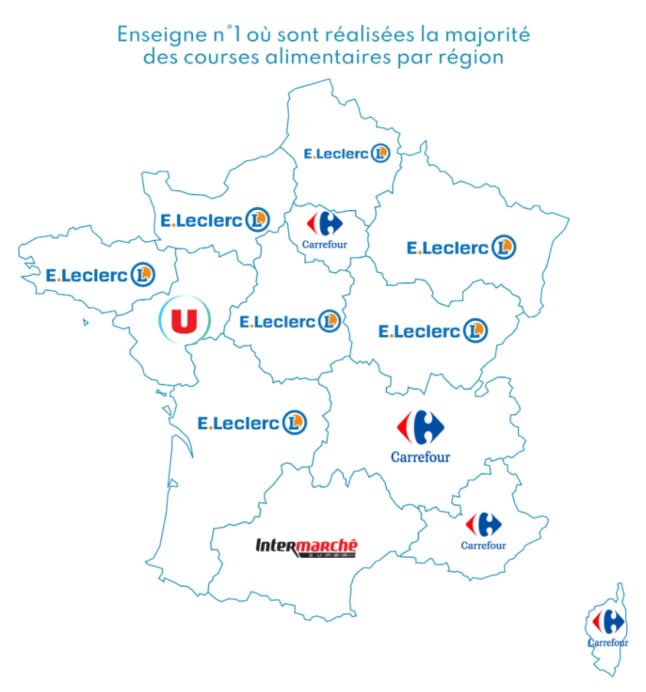France's favourite supermarket revealed

With their wide range of fresh fruit and veg and extensive cheese and charcuterie selections, French supermarkets are popular with visitors - but which chain do the French themselves prefer?
E. Leclerc is the nation's favourite supermarket, according to the study conducted by OpinionWay for Bonial, published on Tuesday.
Of around 5,000 people surveyed, 23 percent listed Leclerc as the place where they do the majority of their shopping. Carrefour came second, favoured by 21 percent of people, followed by Intermarché (12 percent).
German discount retailer Lidl came in fourth with 9 percent, although 45 percent of French people had done some of their shopping in Lidl over the past year.
READ ALSO Readers’ tips: Which supermarket in France is the best to shop at?
Grand Frais, the supermarket which many of our readers recommended in 2018, is where only 1 percent of people in France do most of their shopping.
Organic stores may be gaining in popularity in France, but the results of the survey show that they are a long way from becoming mass-market. The most popular was Bicoop, which 9 percent of people said they had visited over a twelve-month period, followed by Naturalia and Bio c' Bon (3 percent each).
When it comes to food shopping, there are also significant regional variations. The map below shows the leading supermarket in each of France's 13 metropolitan regions.

Graphic: Bonial.
While Leclerc and Carrefour dominate 11 of the 13 regions between them, Système U is over-represented in the Pays de la Loire, where 34 percent of people do most of their shopping in the chain, compared to only 8 percent at a national level.
Leclerc meanwhile is the preferred chain of just 13 percent of people in the Paris region, where many people use smaller city centre stores rather than the large hyper-marchés.
Respondents also ranked Leclerc first for its range of products and special offers, while Lidl came out on top when it comes to price.
Comments
See Also
E. Leclerc is the nation's favourite supermarket, according to the study conducted by OpinionWay for Bonial, published on Tuesday.
Of around 5,000 people surveyed, 23 percent listed Leclerc as the place where they do the majority of their shopping. Carrefour came second, favoured by 21 percent of people, followed by Intermarché (12 percent).
German discount retailer Lidl came in fourth with 9 percent, although 45 percent of French people had done some of their shopping in Lidl over the past year.
READ ALSO Readers’ tips: Which supermarket in France is the best to shop at?
Grand Frais, the supermarket which many of our readers recommended in 2018, is where only 1 percent of people in France do most of their shopping.
Organic stores may be gaining in popularity in France, but the results of the survey show that they are a long way from becoming mass-market. The most popular was Bicoop, which 9 percent of people said they had visited over a twelve-month period, followed by Naturalia and Bio c' Bon (3 percent each).
When it comes to food shopping, there are also significant regional variations. The map below shows the leading supermarket in each of France's 13 metropolitan regions.

Graphic: Bonial.
While Leclerc and Carrefour dominate 11 of the 13 regions between them, Système U is over-represented in the Pays de la Loire, where 34 percent of people do most of their shopping in the chain, compared to only 8 percent at a national level.
Leclerc meanwhile is the preferred chain of just 13 percent of people in the Paris region, where many people use smaller city centre stores rather than the large hyper-marchés.
Respondents also ranked Leclerc first for its range of products and special offers, while Lidl came out on top when it comes to price.
Join the conversation in our comments section below. Share your own views and experience and if you have a question or suggestion for our journalists then email us at [email protected].
Please keep comments civil, constructive and on topic – and make sure to read our terms of use before getting involved.
Please log in here to leave a comment.